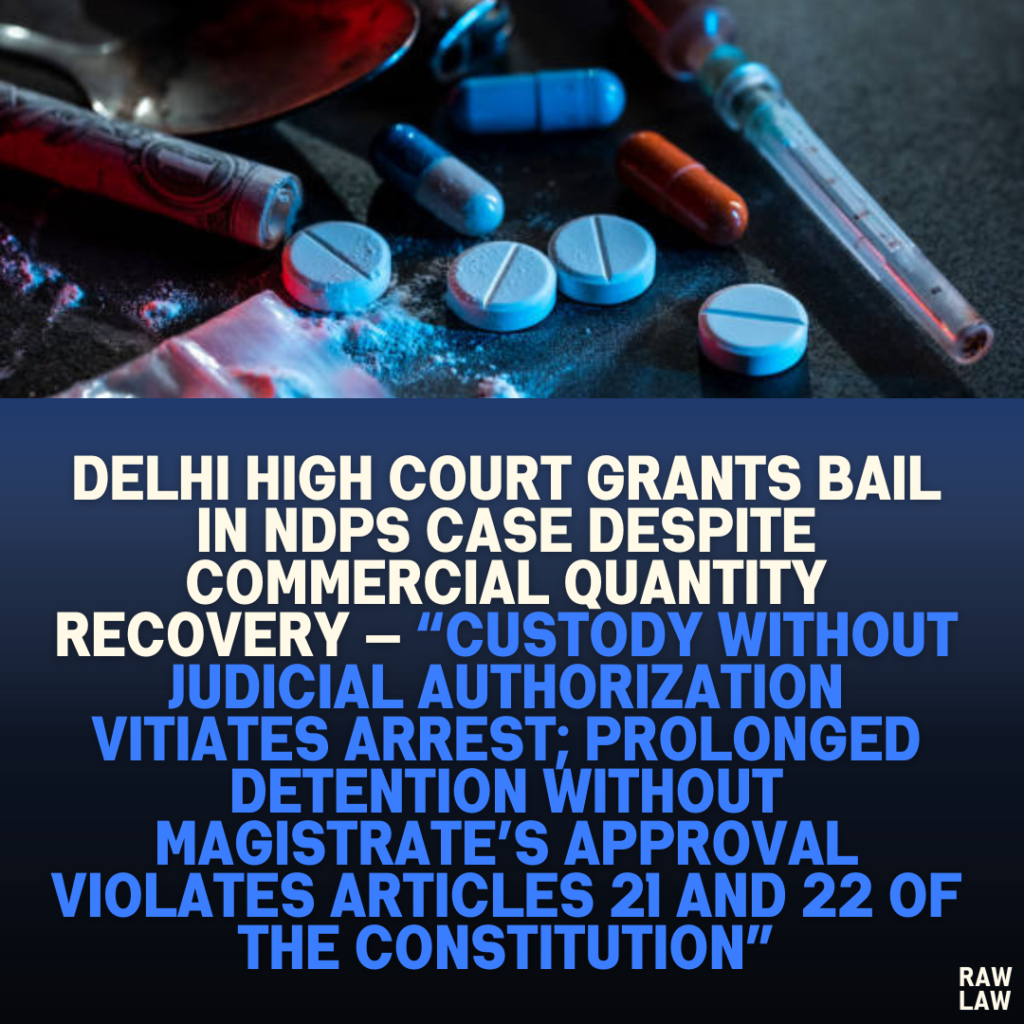Court’s Decision:
The Delhi High Court allowed a bail application under Sections 439 and 482 CrPC in a complaint under Sections 21/23 read with Section 8 of the NDPS Act, where the applicant was charged with smuggling 954 grams of Cocaine Hydrochloride. Despite the recovery of a commercial quantity of narcotics, the Court held the applicant’s arrest on 26.05.2023 to be vitiated due to prolonged unauthorized custody. Justice Amit Sharma observed:
“The applicant was in the continuous custody of the respondent from 21.05.2023 till 26.05.2023 without any authorisation… such custody without any authority and without producing him before the concerned Magistrate or Special Court within 24 hours in accordance with law is completely illegal.”
Facts:
The applicant, an Ethiopian national, arrived at IGI Airport on 21.05.2023 and was intercepted on suspicion by Customs officers. After consent, he underwent an X-ray and was admitted to Safdarjung Hospital where he expelled 75 capsules over a period of five days. These capsules, recovered under a series of panchnamas, were initially suspected to contain Methaqualone but later tested positive for Cocaine Hydrochloride.
Despite his hospital stay and continuous monitoring by Customs, he was only formally arrested on 26.05.2023. The Customs maintained “handing over” and “taking over” memos documenting the applicant’s custody changes among officers, but no production was made before a Magistrate in the interim.
Issues:
- Whether the applicant’s prolonged detention without judicial authorization violates constitutional rights under Articles 21 and 22.
- Whether recovery of commercial quantity under NDPS Act automatically bars bail despite custodial irregularities.
- Whether non-compliance with Sections 42, 50, and 52A of the NDPS Act invalidates the proceedings.
Petitioner’s Arguments:
The applicant contended that:
- He was illegally detained from 21.05.2023 to 26.05.2023 without being produced before a Magistrate.
- No written record of prior information was made under Section 42 NDPS Act.
- Section 50 was violated as he was not given individual notices before each recovery.
- Sample testing under Section 52A was delayed and improperly executed.
- The recovery process was undertaken during unauthorized custody, rendering the seizure inadmissible.
Respondent’s Arguments:
The Customs authority argued that:
- The interception was based on profiling, not prior intelligence, hence Section 42 was inapplicable.
- The applicant voluntarily consented to X-ray and hospitalization; hence there was no illegal detention.
- Panchnamas were duly prepared, and samples were drawn in accordance with law.
- The recovery being of commercial quantity (954 grams of cocaine), Section 37 NDPS Act applied and bail ought to be denied.
Analysis of the Law:
The Court examined the constitutional and statutory safeguards for arrestees:
- Reiterated that custody without Magistrate’s approval beyond 24 hours violates Article 22(2) and amounts to illegal detention under Article 21.
- Noted that officers must adhere strictly to Sections 42, 52, 52A, and 57 of the NDPS Act once a suspect is intercepted or recovery is made.
- Held that mere consent of the applicant cannot override mandatory statutory safeguards.
Precedent Analysis:
The Court relied on the following judgments:
- Niranjan Singh v. Prabhakar Rajaram Kharote, (1980) 2 SCC 559: “Custody” includes any form of duress or physical control by law enforcement.
- ED v. Subhash Sharma, 2025 INSC 141: Failure to produce the accused within 24 hours after detention vitiates arrest and mandates release on bail.
- State of Punjab v. Balbir Singh, (1994) 3 SCC 299: Compliance with procedural safeguards under the NDPS Act is mandatory and procedural violations affect admissibility.
- Kaushik Rameshchandra Thakkar v. State of Maharashtra, 2025 SCC OnLine Bom 1493 and Iqbal Kaur Kwatra v. DGP Rajasthan, 1996 SCC OnLine AP 206: Reinforced that custody without arrest is impermissible and unlawful.
Court’s Reasoning:
The Court found:
- The Customs’ own documents disclosed a “specific intelligence” contrary to their claim of mere profiling.
- Despite continuous custody, no effort was made to produce the applicant before any Magistrate.
- “Handing over” memos and presence of Customs officers throughout established sustained custody.
- The explanation of hospitalization and medication was insufficient to bypass constitutional safeguards.
- The applicant’s arrest was thus “completely illegal” and his “rights under Articles 21 and 22 of the Constitution of India have been violated”.
Conclusion:
The Court granted bail solely on the ground of illegal detention and violation of constitutional rights:
“His arrest on 26.05.2023 stands vitiated. In terms of the judgment of Hon’ble Supreme Court in Subhash Sharma (supra), rights of the applicant guaranteed under Articles 21 and 22 of the Constitution of India have been violated, and therefore, he has to be released on bail despite the restrictions provided under Section 37 of the NDPS Act.”
The applicant was directed to furnish a personal bond of ₹25,000/- with one surety and comply with strict conditions including not leaving India, keeping mobile numbers active, and refraining from tampering with evidence.
Implications:
This judgment underscores that even in cases involving commercial quantities of narcotics under the NDPS Act, violations of constitutional and procedural safeguards can result in bail, overriding the statutory bar under Section 37. The Court reaffirmed that the State cannot sidestep mandatory protections guaranteed under Articles 21 and 22 of the Constitution.
This judgment may prompt greater scrutiny of prolonged detentions under the guise of medical necessity and reinforce the judiciary’s role in checking unlawful custody by enforcement agencies.



